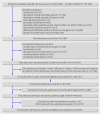Social variations in access to hospital care for patients with colorectal, breast, and lung cancer between 1999 and 2006: retrospective analysis of hospital episode statistics
- PMID: 20075152
- PMCID: PMC2806941
- DOI: 10.1136/bmj.b5479
Social variations in access to hospital care for patients with colorectal, breast, and lung cancer between 1999 and 2006: retrospective analysis of hospital episode statistics
Abstract
Objectives: To determine the extent to which type of hospital admission (emergency compared with elective) and surgical procedure varied by socioeconomic circumstances, age, sex, and year of admission for colorectal, breast, and lung cancer.
Design: Repeated cross sectional study with data from individual patients, 1 April 1999 to 31 March 2006.
Setting: Hospital episode statistics (HES) dataset.
Participants: 564 821 patients aged 50 and over admitted with a diagnosis of colorectal, breast, or lung cancer.
Main outcome measures: Proportion of patients admitted as emergencies, and the proportion receiving the recommended surgical treatment.
Results: Patients from deprived areas, older people, and women were more likely to be admitted as emergencies. For example, the adjusted odds ratio for patients with breast cancer in the least compared with most deprived fifth of deprivation was 0.63 (95% confidence interval 0.60 to 0.66) and the adjusted odds ratio for patients with lung cancer aged 80-89 compared with those aged 50-59 was 3.13 (2.93 to 3.34). There were some improvements in disparities between age groups but not for patients living in deprived areas over time. Patients from deprived areas were less likely to receive preferred procedures for rectal, breast, and lung cancer. These findings did not improve with time. For example, 67.4% (3529/5237) of patients in the most deprived fifth of deprivation had anterior resection for rectal cancer compared with 75.5% (4497/5959) of patients in the least deprived fifth (1.34, 1.22 to 1.47). Over half (54.0%, 11 256/20 849) of patients in the most deprived fifth of deprivation had breast conserving surgery compared with 63.7% (18 445/28 960) of patients in the least deprived fifth (1.21, 1.16 to 1.26). Men were less likely than women to undergo anterior resection and lung cancer resection and older people were less likely to receive breast conserving surgery and lung cancer resection. For example, the adjusted odds ratio for lung cancer patients aged 80-89 compared with those aged 50-59 was 0.52 (0.46 to 0.59). Conclusions Despite the implementation of the NHS Cancer Plan, social factors still strongly influence access to and the provision of care.
Conflict of interest statement
Competing interests: None declared.
Figures




References
-
- Berrino F, De Angelis R, Sant M, Rosso S, Bielska-Lasota M, Coebergh J, et al. Survival for eight major cancers and all cancers combined for European adults diagnosed in 1995-99: results of the EUROCARE-4 study. Lancet Oncol 2007;8:773-83. - PubMed
-
- Janssen-Heijnen M, Gatta G, Forman D, Capocaccia R, Coebergh J, EUROCARE Working Group. Variation in survival of patients with lung cancer in Europe 1985-1989. Eur J Cancer 1998;34:2191-6. - PubMed
-
- Sant M, Aareleid T, Berrino F, Bielska Lasota M, Carli PM, Faivre J, et al. EUROCARE-3: survival of cancer patients diagnosed 1990-94—results and commentary. Ann Oncol 2003;14(suppl 5):n61-71S. - PubMed
-
- Department of Health. A policy framework for commissioning cancer services: a report by the expert advisory group on cancer to the chief medical officers of England and Wales (the Calman Hine report). 1995. www.dh.gov.uk/en/Publicationsandstatistics/Publications/PublicationsPoli....
Publication types
MeSH terms
LinkOut - more resources
Full Text Sources
Medical
Miscellaneous
